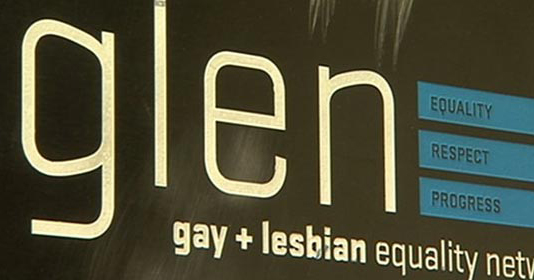The cover of the June 1993 edition of GCN (pictured below) features an iconic picture of a group of four people outside Dáil Eireann, celebrating the decriminalisation of homosexuality with glasses of champagne. Three of those people were members of the Gay and Lesbian Equality Network (GLEN) – Kieran Rose, Chris Robson and Suzy Byrne – and they were not only ringing in a new era for gay and lesbian people in Ireland, they were toasting the culmination of a campaign that had been happening mostly behind closed doors for five years, only reported on in the pages of GCN and fleetingly in the mainstream press.

During this time GLEN perfected their approach to achieving positive change, one that slotted in seamlessly with the way politics works in this country. Instead of agitating with marches and banners, GLEN were ‘inside jobbers’, lobbying ministers and TDs, pulling off seemingly small feats that all the time massaged the greasy political wheel into turning in queer favour.
The fourth person in the picture on GCN’s 1993 cover is Phil Moore of an organisation called Parents Support. In the months before decriminalisation, GLEN effected a meeting between Moore and the then Fianna Fáil Minister for Justice, Máire Geoghegan Quinn. Moore’s mission was to talk to the minister about being a parent of a young gay man, to appeal mother-to-mother for justice for the lesbian and gay children of Ireland. As Geoghegan Quinn said in the Dáil the day of decriminalisation, this meeting was pivotal in making her mind up that gay people should not be criminalised.
Subtle Action
This kind of subtle action, a less showy intervention than shouting out for our rights, was a hallmark of the way GLEN would come to work over the following years, gently prodding the political machine into action by speaking to the right people at the right time, approaching the system on a basis of equality, rather than going in with a begging bowl. And throughout legislative developments along the road of LGBT liberation, from the introduction of the Employment Equality and Equal Status Acts (1998 and 2000), to the introduction of Civil Partnerships in 2010, GLEN were always at the heart of the action, pushing the slow moving wheel forward.
As the years progressed, the organisation became more and more professionalised, garnering significant funding to work on a panoply of issues affecting gay and lesbian people in Ireland, from education to mental health, HIV to workplace diversity. With Director Brian Sheehan guiding the ship, GLEN grew and grew in influence, producing reports and creating resources for teachers, students, employers, older LGBT people and immigrants, among others. Just last year, in the wake of marriage equality, GLEN produced the LGBTIreland report, the largest ever study of the mental health and wellbeing of lesbian, gay, bisexual, transgender and intersex (LGBTI) people in Ireland, which found that all was not rosy in the gay garden, particularly for younger people. And that is only the tip of the iceberg in terms of the work GLEN did.
Not Everyone Agreed
Not everyone agreed with GLEN’s methods, or their reasoning. More radical groups didn’t like the way GLEN cosied up to the establishment, making friends with politicians who didn’t on the surface of things seem to be doing anything much for LGBT emancipation and equality. There was a deep division between Marriage Equality and GLEN about how equal marriage should be achieved in Ireland, with GLEN taking the view that civil partnership was a step in the right direction, while Marriage Equality believed the only option was full equality under the 2004 Civil Registration Act.
But after civil partnership was achieved, GLEN stuck to their guns and began to massage the political system in the direction of equal marriage, and in 2014 the two organisations came together to start working on the mammoth task of achieving that end. From presenting at the Constitutional Convention, which recommended the provision of legislation for same-sex marriage, to the resultant referendum, Marriage Equality and GLEN worked hand-in-hand.
Sheehan and Marriage Equality’s Grainne Healy headed up the Yes Equality campaign, which was not only victorious in passing the referendum, but in changing the way political campaigns worked in this country, while providing an example of the way forward LGBT organisations and marriage campaigns in many other countries.
It is with great sadness that I received the news today that GLEN, after almost 30 years of effectively and professionally achieving positive change for Ireland’s LGBT community, will be closing their doors. The headlines last month, with their whiff of accusation about financial misappropriation (despite no evidence of such) were a smear too much to overcome for an organisation that relied on public and philanthropic funds.
Whether you agreed with their methods or not, GLEN worked hard and tenaciously for equality in Ireland, and this country would not be the leader it is in terms of LGBT rights without them. As the LGBTIreland report last year pointed out, there is still much work to be done, and while we do have professionalised youth and trans organisations, they don’t have the resources or remits to take on every other piece of the complex pie. In the Programme for Government there is a commitment to develop a wide-ranging LGBT strategy, of which the current LGBT Youth Strategy is just a part. Who is going to take that work on now that GLEN is gone?
GCN has been in the same office building as GLEN for six years, and we’ll miss them. On a personal note, I salute all the great people who have worked for GLEN over the years with passion and deep commitment, and I thank them for making Ireland an immeasurably better place for all of us.
© 2017 GCN (Gay Community News). All rights reserved.

comments. Please sign in to comment.